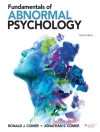Bridging an understanding of Statistics and SPSS.
‘The text is written in a user-friendly language and illustrates concepts that would otherwise be confusing to beginning students and those with limited computer skills.’
-Justice Mbizo, University of West Florida
This unique text helps students develop a conceptual understanding of a variety of statistical tests by linking the ideas learned in a statistics class from a traditional statistics textbook with the computational steps and output from SPSS. Each chapter begins with a student-friendly explanation of the concept behind each statistical test and how the test relates to that concept. The authors then walk through the steps to compute the test in SPSS and the output, clearly linking how the SPSS procedure and output connect back to the conceptual underpinnings of the test. By drawing clear connections between the theoretical and computational aspects of statistics, this engaging text aids students′ understanding of theoretical concepts by teaching them in a practical context.
(Please note: unfortunately, the student resource website for this title is no longer active or available.)
Mục lục
1. Introduction
2. Descriptive Statistics
3. Chi-Squared Test
4. Linear Correlation
5. One- and Two Sample T-Tests
6. One-way ANOVA
7. Two- and Higher-way ANOVA
8. Within-subject ANOVA
9. Mixed-model ANOVA
10. MANOVA
11. Regression
12. ANCOVA
13. Factor and Components Analysis
14. Psychometrics
15. Non-parametric Tests
16. Matrix Algebra
17. Appendix on the General Formulation of Custom Contrasts using Syntax
Giới thiệu về tác giả
Steve P. Reise is professor, chair of Quantitative Psychology, and co-director of the Advanced Quantitative Methods training program at University of California, Los Angeles. Dr. Reise is an internationally renowned teacher in quantitative methods; in particular, the application of item response theory models to personality, psychopathology, and patient reported outcomes. In recognition of his dedication to teaching, Dr. Reise was named ‘Professor of the Year’ in 1995-96 by the graduate students in the psychology department at UC Riverside, and was awarded the 2008 Psychology Department Distinguished teaching award. Most recently, in recognition of his campus-wide and global contributions, Dr. Reise was awarded the University of California campus-wide distinguished teaching award. Dr. Reise has spent the majority of the last twenty years investigating the application of latent variable models in general and item response theory (IRT) models in particular to personality, psychopathology and health outcomes data. In 1998, Dr. Reise was recognized for his work and received the Raymond B. Cattell award for outstanding multivariate experimental psychologist. Along with Dr. Susan Embretson, Dr. Reise has the leading textbook on item response theory called ‘Item Response Theory for Psychologists’ (2000 and forthcoming). He received his Ph.D. from the Department of Psychology at the University of Minnesota.












